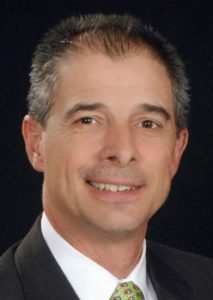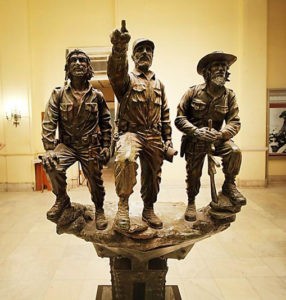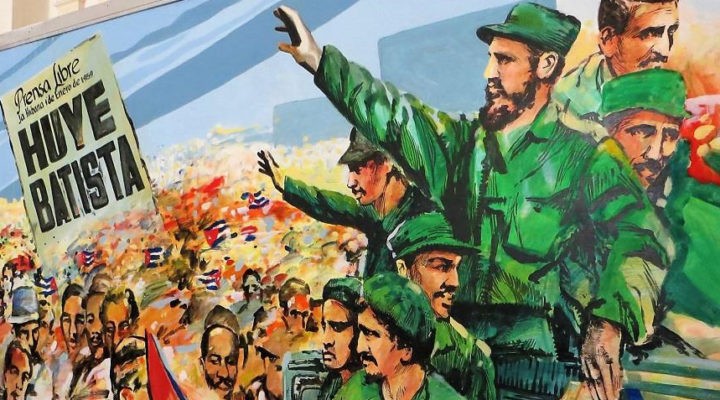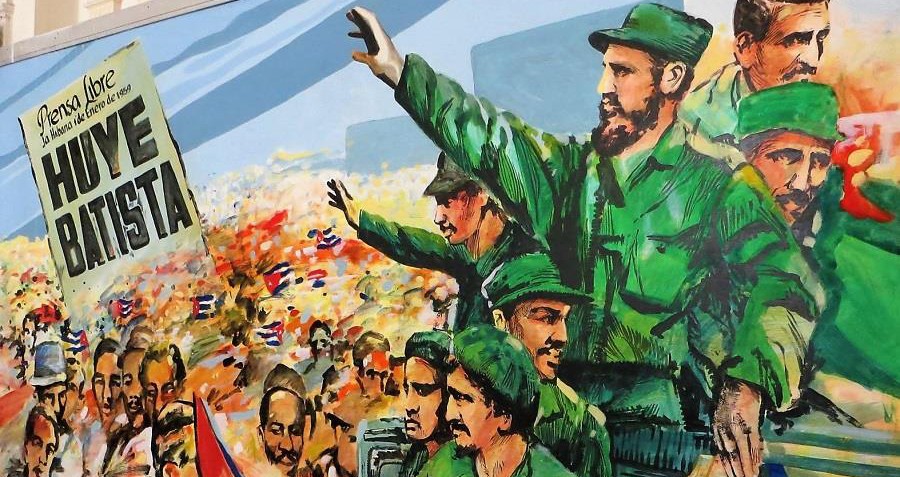If nothing else has frightened you about our national leadership in the last few years, take a visit to Cuba, and then come back and listen to our Leader of the Free World extolling his new program of “Patriotic Education.”
For 17 years, a delegation from our church has traveled to Cuba annually. We make this pilgrimage to spend a long weekend furthering the relationships we have built with our partner congregation in Carlos Rojas. That small, rural farming community is two-and-a-half hours east of Havana. We fly on a commercial U.S. plane, but when the landing gear touches the Cuban tarmac (and the passengers erupt in applause), we’re in a different world.

Russ Dean
I have described the Cuban island as a land of great contrasts. The people are joyful and happy but subsist just above hunger. The land is fecund with colorful Caribbean vegetation, but plates are bland: rice and beans, yucca and plantains are served at every meal. There’s a freedom of joyful expression in the streets, in arts, in worship, yet the watchful eye of government casts a quiet pall over the landscape.
Even the celebration of heroes manifests this contrast. Portraits of Che Guevara (“El Che”) are everywhere, the face of exuberant victory over Batista’s dictatorial leadership. And portraits of Fidel Castro (still Fidel) are even more ubiquitous. He also is a national hero, but his image is a quiet reminder of the hand of repressive control.
Our few days each year are packed with travel and time with the people. It is an inspiring experience, seeing people do so much with so little, and knowing such joy without the creature comforts that have become our way of life. It also is a bit depressing, imagining what might be if our friends were allowed to truly breathe free. There is a personal sting to this pain, also, because it is our economic embargo — which continues to fail to bring down a communist government, even after 60 years — that is the cause of the suffering of the people. (The people say, “Only Fidel wins with the embargo.”)
In one of our first trips, while Fidel was alive and well, I asked the young pastor of our sister church what would happen when he dies. “Will there be revolution? Will there be democracy?” This young man, educated in economics in one of Cuba’s fine universities before seeking a divinity degree, spoke for many Cubans: “We don’t need democracy. Socialism is good. But our people do need more. We need change to our system, but socialism is fine.”
He saw the value of universal education and universal health care. He knew of the rampant crime in the U.S. and reminded me that young Cuban women stand on street corners at night and on darkened rural roads hitch-hiking home after work, and there is virtually no crime. “Socialism is good.”
It’s all he had ever known.
That conversation reminded me of the education I received on our first trip to Cuba. Longer than our recent missions, we spent a number of days in Havana and the outskirts, sightseeing in order to learn about Cuban history and culture and religion. Two hours in Havana’s Museum of the Revolution was one of the most eye-opening experiences of my life.
 Outside there is a replica of the “Granma,” the famous ship that brought Fidel and El Che to the island to instigate revolution, and inside, the walls are filled with photographs and memorabilia and displays that are tributes to Cuba’s brave past — especially its powerful stands against the “imperialist aggressors to the north.” In exhibit after exhibit — the Bay of Pigs, the Cuban Missile Crisis, the Soviet period in Cuba — the U.S. is branded the evil aggressors in the relationship between the two nations. The Cuban “revolution,” I was told, was about the people, empowerment and prosperity, the end of a brutal dictatorship. U.S. involvement, on the contrary, was all about power and control and corruption — imperialism, aggression, violence.
Outside there is a replica of the “Granma,” the famous ship that brought Fidel and El Che to the island to instigate revolution, and inside, the walls are filled with photographs and memorabilia and displays that are tributes to Cuba’s brave past — especially its powerful stands against the “imperialist aggressors to the north.” In exhibit after exhibit — the Bay of Pigs, the Cuban Missile Crisis, the Soviet period in Cuba — the U.S. is branded the evil aggressors in the relationship between the two nations. The Cuban “revolution,” I was told, was about the people, empowerment and prosperity, the end of a brutal dictatorship. U.S. involvement, on the contrary, was all about power and control and corruption — imperialism, aggression, violence.
I kept thinking to myself: “This is such baloney. This is not at all what really happened.”
Welcome to Patriotic Education.
I got enough American patriotism through my early education to become sentimental about it. I’m grateful for that. Those lessons were good and appropriate for an impressionable child. I learned to recite the pledge and can still get goosebumps singing the National Anthem. I learned about Paul Revere’s famous ride to start our own noble revolution, about Patrick Henry’s brave stand of liberty or death, of Betsy Ross, George Washington, Honest Abe. Being a South Carolinian, the Civil War education I received should probably be called “fair and balanced.” (I think that’s a fair assessment. It’s not necessarily a compliment.) In all, I learned to celebrate my heritage and my history — but uncritically so. I was proud to be an American. I was proud my nation stood for “inalienable rights” and “liberty and justice for all.” In national and international affairs, we were always the good guys.
“I learned to celebrate my heritage and my history — but uncritically so.”
It’s all I had ever known.
My most important lessons in patriotism, however, came from the education I received that was not wrapped in red, white and blue. It was “education.” Period. The late William Sloane Coffin, once pastor of New York’s famed Riverside Church and a chaplain of the U.S. Senate, often spoke of his “lover’s quarrel with his country.” Patriotism is never afraid of truth, no matter how revealing or self-critical history might be.
What I missed in my elementary education was the honesty of an unvarnished view — which is what true education means. Honesty. A commitment to objectivity. Voices of dissent. Self-critique. The brutal truth-telling that will sometimes make you blush or wince — or demand repentance — has not made me less patriotic. Far from it. In truth, I’ve never been more patriotic, never more committed to the best of what this nation has been nor more concerned for its future than I am at this very moment.
If we want to live up to the ideals established in a daring Constitution, and if we want to be true to our faith — to the truth (that) will set you free — we can never settle for anything less than the best education we can find, unvarnished history, honest critique, however brutal that may be.
If you want to see the result of Patriotic Education, I suggest a visit to Havana.
Russ Dean is co-pastor of Park Road Baptist Church in Charlotte, N.C. He holds degrees from Furman University, Southern Baptist Theological Seminary and Beeson Divinity School. He and his wife, Amy, have been co-pastors of Park Road since 2000. They are parents of two sons. Russ is active in social justice ministries and interfaith dialogue.


